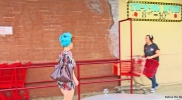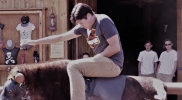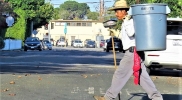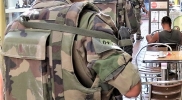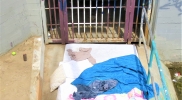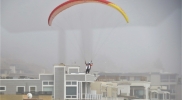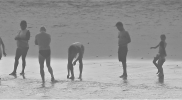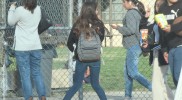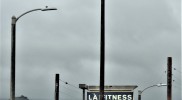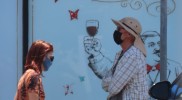|
|
Best Trivia - War
| Favorite Trivia – WAR
|
|
Barrage Balloons: Blimp-like air ships filled with hydrogen gas at the bottom that would fill with outside air when raised. Barrage balloons were placed in strategic locations, such as ports and harbors in London during WWII (and at the end of WW I). They were connected to metal cables that could be lowered or raised and were designed to thwart German aircraft from invading low-level air space. Planes or V-1 flying bombs would explode upon contact with a barrage balloon or would crash upon contact with its cables. |
| “There is a lot of talk around town to the effect that the Japanese, in case of a break with the United States, are planning to go all out in a surprise mass attack on Pearl Harbor. Of course I informed our Government.” [January 28, 1941]
Ten Years in Japan: A Contemporary Record Drawn from the Diaries and Private and Official Papers of Joseph C. Grew, United States Ambassador to Japan, 1932-1942 – Joseph C. Grew
|
| “The best armor is to keep out of range.”
David Baird – A Thousand Paths to Enlightenment
|
| “It is considered bad luck to light three cigarettes with the same match but the truth of this myth comes not from superstition but trench warfare in WWI when snipers would take careful aim and fire a fateful bullet at the third target.”
David Baird – A Thousand Paths to Good Luck
|
| “These Digger Indians seem to be the lowest of all God’s creation. They still use the old bow and arrow. Consequently, they have great respect for the white man who can send a leaden bullet through a ‘Bull’s-Eye’ one hundred yards distant… They never bring their squaws with them when they visit, which is not very complimentary to either squaw or white man… When the various bands go to war—which, by the way, is an everyday affair—the victorious band always take their enemies’ squaws, the latter being all they have that is worth anything… Tis no wonder then these bands are continually at war. What man would not fight for a woman, and a buck Digger Indian is partly man and partly beast. The man part fights for the woman, while the beast part makes her do all the work. Some of the young squaws are fairly good-looking—about the color of a new saddle—with raven black hair and black eyes, but they seem to fade early.” [January 1, 1850]
Dreams to Dust: A Diary of the California Gold Rush, 1849-1850 – Charles Ross Parke
|
|
“The president told me about a corporal, who is eager to serve on firing squads. He generally aims at the heart, but if he does not like the man to be executed, then he aims for the head, causing it to shatter. It is a subhuman trait to want to disfigure, to want to rob another person of his face.” [May 29, 1944]
Ernst Jünger – A German Officer In Occupied Paris: The War Journals, 1941-1945 |
| “In the compartment, conversation with a lieutenant returning from Russia. His battalion lost a third of its men to the freezing temperatures, in part because of the amputations. The flesh turns white, then black. Conversations like this are now quite common. He says there are field hospitals for soldiers with frostbitten genitals, and even their eyes are endangered. Frost and fire conspire like the two blades of a vicious pair of shears.” [January 2, 1942]
“People have seen corpses lying on the tarmac that have been crushed by thousands of tanks until they are as flat as sheets of paper. The march goes right over them, as if over decals or designs visible in the icy depths of the roads.” [March 6, 1942]
A German Officer In Occupied Paris: The War Journals, 1941-1945 – Ernst Jünger (trans. by Thomas S. Hansen and Abby J. Hansen)
|
| “Comin’ in on a Wing and a Prayer”
Title of popular song of WWII
|
| “Today I witnessed a sad sight—the execution of a soldier who deserted from a Jersey Regiment. The condemned man first rode about the camps in an ambulance and seated upon his coffin… I tried to get excused from attending but did not succeed. As we arrived at the place of execution the lines were formed on three sides of a square with the grave on the fourth side. The coffin was placed near the grave and the condemned man was seated upon it with his eyes bandaged. A firing party was drawn up in front of him, and after the prayer by the Chaplain, the Provost Marshal gave the commands: ‘Ready, Aim, Fire.’ I made up my mind that I would not look at the scene, but when I heard the commands given I almost involuntarily looked towards the firing party and saw it all. As the reports of the muskets were heard the man fell back dead. The body was placed upon the top of the coffin and the Division marched by in column of companies and as each Company approached the grave the Captain gave the command ‘Eyes right,‘ and each soldier was obliged to look at the body. I was glad when it was over.” [January 6, 1865]
All For The Union: The Civil War Diary and Letters of Elisha Hunt Rhodes – Elisha Hunt Rhodes
|
 |
| “Citoyen Boyer, surgeon, who has been so cowardly as to refuse help to some wounded because they were supposed to be infected, is unworthy of being a French citizen. He is to be dressed in women’s clothes, and paraded through the streets of Alexandria on a donkey, with a board on his back, on which shall be written: Unworthy of being a French citizen—he fears death. After which he is to be placed in prison, and sent back to France by the first ship.” [January 8, 1799]
A Diary: Napoleon Bonaparte – Napoleon Bonaparte
|
| “… two American squadrons flew over in broad daylight. They ran into massive anti-aircraft fire over the city, and not long afterward, we saw one of the planes return with a stream of smoke coming from its right wing. Massive anti-aircraft fire followed it out of the cauldron and went silent once its fate became clear. Above us the plane plunged downward in a curve as three parachutes dropped clear of it . . . After the famous void of the battlefield, we enter a theater of war encompassing operations that are visible for miles around. As a result, hundreds of thousands, perhaps millions, of spectators participate in the great aerial battles.” [Kirchhorst, April 7, 1944]
Ernst Jünger – A German Officer In Occupied Paris: The War Journals, 1941-1945
|
| “Today nine of the patients ‘went convalescent’ [Royal Herbert Hospital WWI]. They departed, hobbling and on stretchers, at two o’clock, with bursts of song, plastered hair, bright buttons, and not a regret. . . Today they had some small bottles of stout to help us say good-bye to the Nine. Happiness is cheap. Last night at dinner a man said as he refilled his glass with champagne, ‘It makes me sad to think how much happiness there is in a bottle. . . ‘”
Enid Bagnold [author of National Velvet] – A Diary Without Dates
|
| “… As Mrs. Delany sat cutting and pasting… across an ocean the British troops had secured Quebec, while George Washington in Boston, was inoculating his troops against smallpox—by making a cut in the skin and pushing a pox in—turning poison into medicine, and saving lives that would turn a war… “British general Lord Cornwallis was so sick at having to surrender to George Washington at Yorktown that he retreated to his tent. He summoned his Irish underling, General O’Hara, and ordered him to ride out to hand over the British troops.”
Molly Peacock – The Paper Garden: Mrs. Delany [Begins Her Life’s Work] at 72
|
| “The canneries themselves fought the war by getting the limit taken off fish and catching them all. It was done for patriotic reasons, but that didn’t bring the fish back. As with the oysters in Alice, ‘They’d eaten every one.’ It was the same noble impulse that stripped the forests of the West and right now is pumping water out of California’s earth faster than it can rain back in. When the desert comes, people will be sad; just as Cannery Row was sad when all the pilchards were caught and canned and eaten.”
John Steinbeck – Sweet Thursday
|
| “In the windows of the neighborhood now you saw small flags bearing a star for each son who had gone to serve the country [WW II] … some of the stars were gold, telling us that a son had died.”
Pete Hamill – A Drinking Life
|
| “A look into the future offers a pretty gloomy prospect, even if we’re lucky enough to avoid the war. Our exports to the West have seized up entirely. And our imports, of course… But I’m sure this is just the beginning for us [Sweden]; the total blockade hasn’t been in force for long. So we can always comfort ourselves with the thought that it’ll only get worse.” [April 14, 1940]
Astrid Lindgren – War Diaries, 1939-1945
|
| “As a result of eating shoulder of mutton stuffed with onions to excess, Napoleon suffered from excruciating indigestion on the disastrous third day of the Battle of Leipsic; but this was no fault of the mutton or the onions, for, as Brillat-Savarin coldly observed, he ate badly and bolted his food.”
P. Morton Shand – A Book of Food
|
| “Elisha, the fifer boy, lies upon the deck as though carved into the wood. I spend much of my time sitting by him, listening to his childish tales of the battle . . . At noon today, he begs me to carry him to the edge of the deck so that he can look down into the water. I do, and lay him face down at the railing, lifting and holding him so that he peers straight down along the side of the vessel. He is delighted to see his reflection in the still water. “‘Take off my bandage, he says, ‘I want to see my wound.’
“‘No,’ I say. ‘Why would you want to see your wound?’
“‘Because I want to see what I have suffered for my country.'”
Richard Selzer – Confessions of a Knife
|
| “In the final months of World War II, Dresden and perhaps 50,000 of its inhabitants were incinerated in a firestorm of Allied bombing, the greatest conflagration in the western theater of the war… There is a host of stories about the horror of the firestorm and its aftermath that might drive anyone, man or child, mad, unspeakable things that might turn you to stone were you to see them: cellars, for example, packed with asphyxiated, bloated corpses of mothers and children… during the bombing, Dresdeners instinctively took shelter there, but the updraft of the firestorm outside literally sucked the oxygen from the basements. “The air temperature rose into the hundreds of degrees. Many people fled to the bank of the Elbe and immersed themselves in the water. Others tried to evade the heat by hiding in water tanks and fountains. But as the air temperature increased, the water in the fountains heated as well. Those who sheltered in them were boiled alive and then the water itself evaporated, leaving their corpses beached in the empty pools.’
Robert Clark – “Bayham Street” (The Inevitable: Contemporary Writers Confront Death, ed. by David Shields and Bradford Morrow)
|
| “He [Whitey #2] never forgave the Marine Corps for taking his prize away from him—a quart jar of ears pickled in brandy. He’d wanted to put that jar on the shelf over his bed, a memento of his service to his country.”
John Steinbeck – Sweet Thursday
|
| [Enid Bagnold worked as a VAD (Voluntary Aid Detachment) at the Royal Herbert Hospital, Woolwich]
“To see them pass into Mess like ghosts—gentleman, tinker, and tailor; each having shuffled home from death; each having known his life rock on it base . . . not talking much—for what is there to say?—not laughing much, for they have been here too long— . . .
“Watchmakers, jewellers, station-masters, dress-designers, actors, travellers in underwear, bank clerks . . . they come here in uniforms and we put them into pyjamas and nurse them; and they lie in bed or hobble about the ward, watching us as we move, accepting each other with the unquestioning faith of children.”
Enid Bagnold [author of National Velvet] – A Diary Without Dates
|
| “Oh, my piglets, we’re the origins of war. Not history’s forces nor the times nor justice nor the lack of it nor causes nor religions nor ideas nor kinds of government nor any other thing. We are the killers; we breed war. We carry it, like syphilis, inside. Dead bodies rot in field and stream because the living ones are rotten. For the love of god, can’t we love one another just a little? That’s how peace begins. We have so much to love each other for; we have such possibilities, my children. We could change the world.”
(Eleanor, wife of Henry II, to her two sons, Richard, John, and Geoffry) The Lion in Winter (play) – James Goldman
|
| “I slept well on a tatami mat warmed by Ondol, an underfloor heating system which, like the Roman hypocaust, uses hot air from wood fires beneath the tiles… The strip of land that divides Korea into communist North and capitalist South is known as the DMZ, the Demilitarized Zone. It was set up by the North Koreans, Chinese and the UN after the armistice in 1953, to replace the notorious 38th Parallel, the old border line, which had its roots in the ideological partition of Korea between the Soviet-backed North and the American-backed South at the end of the Second World War. “In 1950 fighting began in a bitter civil war which both sides blamed the other for starting. The North Koreans took Seoul but the United Nations forces under the command of US General Douglas MacArthur rallied, pushing the DPRK forces back across the border. The Chinese then threw huge numbers in defense of their fellow communists and pushed the UN forces back south of Seoul. Stalemate set in, and it was only after newly elected US President Eisenhower allegedly threatened to use atomic weapons against the North that the two sides came to the table, bringing a halt, but not an official end, to hostilities.
“The DMZ is a buffer zone, 2.5 miles wide and running 160 miles from one side of the peninsula to the other. It is meant to be a weapons-free area, though officers are allowed to carry a pistol… Huge speakers used to blast propaganda and martial music at South Korea. I’m told that in the new spirit of detente these were shut down and dismantled two days ago.” [May 3, 2018]
Michael Palin – North Korea Journal
|
“[The sighting of the enemy ship:] . . . “Next from the deck we saw the approaching foe,
Her spangled bottom seemed in flames to glow. . .
“With all her might she strove to gain our tack,
Nor strove in vain—with pride and power elate. . .
“Death in her front, and ruin in her rear. . .”
Philip Freneau – The British Prison Ship: Canto 1. The Capture
|
| “Mere months ago I used to work on Water Street, not five blocks from the Trade Center buildings. This is the first time I’ve been really glad they fired me; I can’t imagine having been trapped down there, and I wonder about my former co-workers… “I hope it’s the Palestinians,’ said an Israeli girl at a local cafe, ‘I mean, I’m sorry it happened, but I hope it’s the Palestinians because then it wouldn’t just be the Israelis against them, but the Americans too and that would be great.'” [September 12, 2001]
Eric Rosenfield Diaries
|
ARMY: Plus factors for draftees and volunteers:
You relinquish responsibilities—which is very reposing.
You relinquish decisions—which is very reposing.
You gain a definite target to gripe at—which is very reposing.
You are being fed—eliminating again your decision, providing another reason for griping.
You are taken away from Mother—which is high time.
You get a uniform—the most attractive attire a man can wear: it prohibits you from spoiling
your appearance should you have bad taste.
You relinquish another decision: what tie to choose. Girls trust you.
You learn—discipline, mental and physical.
You learn—to live with other people.
You learn—how to take it.
You learn—esprit de corps.
You learn—to pull in your belt.
You learn—to surrender privacy.
You learn—that you can stand much more than you thought.
You learn—to live by a timetable.
You learn—to put up with rude awakenings.
You learn—cleanliness (if your mother never quite succeeded).
You learn—to cook and to peel potatoes and to bear the unavoidable with dignity.
Marlene Dietrich’s ABC
|
| “After World War II, the Communists in the north and the Kuomintang in the South [of China] attempted to capture territory that had been Japanese-occupied during the war. A civil war ensued, which brought the Communists to power in 1949, under the leadership of Mao Tse-tung, who attempted to revolutionize Chinese society. The ‘Great Leap Forward’ of the 1950s was his ambitious program of industrialization and social reform (which substituted the commune for the traditional family). During political power struggles of the 1960s, Mao, whose power base was the military, tried to seize control of the highly developed bureaucracy of Chinese society by initiating the “Great Proletarian Cultural Revolution.’ Militant young people converged on Peking and marched in Tiananmen Square. In their fervor to display patriotism, they destroyed art works and historical archives, burned books, denounced intellectuals, and attacked dissidents. . . Order was gradually restored, and while the ‘Cultural REvolution’ is credited by some with having eroded class difference, its cost was high. . .
“Mao’s death in 1976 brought with it economic liberalization, but political reforms did not keep pace. In April 1989, students at the University of Beijing began to demand greater democracy within the People’s Republic of China. This agitation gained force during a memorial rally in Tiananmen Square. . . Pro-democracy demonstrations were held in other major cities in China. . . Martial law was declared on May 20, but the large public demonstrations continued. On the night of June 3, troops were sent into Beijing to clear Tiananmen Square. . . at least one thousand people, including children and the elderly, were shot or otherwise killed by the military.”
Against Forgetting: Twentieth Century Poetry of Witness – ed. by Carolyn Forché
|
| Scott McDermid, who fought in Vietnam, said it isn’t always easy for him to be around people. “Once you’ve had someone’s insides on your outsides, you’re never the same. Never.”
Scott McDermid speaking to Diana Marcum (Los Angeles Times article about Don Russell, owner of Mountain Messenger newspaper, January 7, 2019).
|
| “Yesterday evening I saw Gunnar, just back from Finland…He was impressed by the Finnish civilians, who are carrying on as normal despite the bombs the Russians are hailing down on them… Gunnar described the course of events when the Finns wiped out 12,000 Russians on the ice of Lake Kiantajarvi. The Russians came in along a road that ended in the middle of nowhere, and had to go out onto the frozen lake. Then the Finns surrounded them. Three times the Finns urged the Russians to surrender, but they have orders not to let themselves be taken alive. After the third request, the Finnish artillery and planes opened fire on the frantic troops on the ice. When 900 out of the 12,000 were left alive on the ice they surrendered, poor devils. But there are still more than 11,000 Russians lying on the Kiantajarvi ice. What will happen in the spring, when it gets warmer?” [February 1, 1940]
War Diaries, 1939-1945 – Astrid Lindgren
|
| “At some point, my mother received ration books and tokens. When she went to buy meat or butter, she needed to hand over the ration stamps or dime-sized cardboard tokens. She saved bacon fat in tin cans, and when she turned in the bacon fat at Semke’s butcher shop, she was given more tokens in exchange. Once a month, she said, the government picked up all the cans of bacon fat. One day, I asked my father why the army needed bacon fat. “‘To grease the guns,’ he said. ‘And for the soldiers to put on their boots to keep out water.’
“I tried to imagine this. Wouldn’t the Nazis smell breakfast when the Americans tried to sneak up on them in a raid?”
A Drinking Life – Pete Hamill
|
| “The army of a hundred thousand men, now reduced to thirty thousand, was accompanied by a mob of fifty thousand camp-followers… Napoleon placed them under the orders of M. de Latour-Maubourg. This officer, who led the cuirassiers in the attack on the great redoubt at Borodino, had his head split open by sword-thrusts; later he lost a leg at Dresden. Seeing his orderly weeping he said to him: ‘What are you complaining about? You will only have one boot to polish now.'”
François-René de Chateaubriand – The Memoirs of Chateaubriand
|
| “… Hanne Wickenberg came by, as she does every Friday. We talked about the female Air Force Auxiliary personnel who were killed last week in the big attack on Misburg. They were found without any signs of external injury, lying close beside one another in the communications trenches. They died when their lungs ruptured. Because the air pressure of the shockwave had stripped off all clothes and underwear from their bodies, they were completely naked. A farmer who helped bury them was quite overcome by this horrible indignity: ‘All such big, beautiful girls, and heavy as lead.'” [Kirchhorst, December 8, 1944]
Ernst Jünger – A German Officer In Occupied Paris: The War Journals, 1941-1945
|
| “Mixed in with the bomb payloads are some with time-release fuses that don’t explode for hours, or sometime even days… last year’s attack on Berlin on Christmas Eve, the fuses were timed to go off at the hour when presents were being exchanged.”
Ernst Jünger – A German Officer In Occupied Paris: The War Journals, 1941-1945
|
| “I embrace my rival, but it is in order to choke him.”
Nero to Burrus, on his pretended reconciliation with Britannicus (Classical and Foreign Quotations, ed., W. Francis H. King)
|
| “Wars and roses have a long relationship. The English civil wars, waged from 1455-1485, over the possession of the crown, were called the Wars of the Roses. The name came from the badges of the house of Lancaster (a red rose) and the house of York (a white rose). Battles were long, bloody and bitter, fought over a series of weakened monarchs until Henry VII married Edward IV’s daughter Elizabeth in 1486, thereby united the two adversarial houses.”
On Flowers – Kathryn Kleinman & Sara Slavin
|
| “I watched a friend last night who had invited me to his home for super, stop at seven grocery stores to find butter and found none. The street lamps are hooded from above here, wardens patrol the streets for cracks in window shades, etc. There are barrage balloons along the coast, and searchlights (and of course, A.A. [anti-aircraft, hidden) in all sorts of unexpected places throughout the city: in all the canyons, and now and then on the playgrounds of schools. They expect a bombing here. But nobody is afraid of it….” [December 6, 1942]
William Faulkner, to his stepson – Dear Los Angeles (ed. by David Kipen)
|
| “Memoirs told me about the sound of explosions as the retreating French soldiers blew up the city’s arsenals… Then there are many descriptions of the sheer overwhelming weight of vehicles and numbers of German soldiers that marched into the city on the 14th [June, 1940]… Given that so many of its people suffered and died at the hands of the occupying forces, it is ironic that the fabric of the city itself was not destroyed. It was fascinating to read why it survived and to find what a close call it had been. “On June 13, 1940, the American ambassador William Christian Bullitt Jr., whom the departing French government had left as a temporary mayor of the city the day before, assured the German army commanders that Paris would be open to them—that is, in return for peaceful occupation, the citizens would not resist. And so it happened.
“Four years later, as the Allied forces surrounded Paris and its citizens rose in revolt against its Nazi occupiers, Hitler ordered that the city be razed to the ground. Explosives were planted under every bridge and power station and water-pumping plant, as well as under the most famous monuments: the Eiffel Tower, the Louvre, Les Invalides with Napoleon’s tomb. But the general in charge, Dietrich von Choltitz, hoping to calm the uprising, delayed executing the Fuhrer’s orders, and after that, events overtook him. And so the city itself was spared.”
Rachel Hore “Finding Paris’s Hidden Past” – A Paris All Your Own, ed. by Eleonor Brown
|
| “Supersensitive as I have always been to visual impressions, the horrible and hideous symbols of German domination made the city I loved hateful [Paris]. Gigantic banners filled the streets and were unescapable. They did not float over the housetops and towers like the flags of civilized nations so that one had to raise the eye to see them, but hung in the direct line of vision, suspended like huge carpets waiting to be beaten. Sometimes they veiled several stories of an unofficial building. Each time I crossed the threshold, or even looked forth from my balcony, it was like receiving a blow between the eyes and a stab which reached the heart.” – Clara de Chambrun
Charles Glass – Americans in Paris: Life & Death Under Nazi Occupation
|
| “Polly drove her ambulance in mid-September to a hospital for wounded prisoners at Rouen, near Paris. A physician there said that hospitalized French soldiers who were well enough had been taken to a train three days before, part of the German programme to transfer 1.58 million French prisoners of war to camps in Germany. When two French officers leaned out of one train to take a last breath of French air, a sentry shouted at them in German. The doctor thought that ‘they either hadn’t heard or hadn’t understood, for the two officers went right on looking, and talking to each other. The sentry addressed them again; still nothing happened. He then picked up his rifle and shot them both through the head.’ One was killed instantly and the other died in the hospital an hour before Polly arrived.”
Charles Glass – Americans in Paris: Life & Death Under Nazi Occupation
|
“. . . the guards lead the condemned man to the ash tree . . . I remember that I am supposed to
ask whether he wants a blindfold. The clergyman softly answers yes for him while the guards tie him to the tree with white ropes. . . Then he kisses a small silver cross while the doctor pins a piece of red cardboard the size of a playing card onto his shirt over his heart.
“In the meantime, the firing squad has followed a signal from the first lieutenant and has taken up their positions standing behind the clergyman, who still blocks the condemned man. He now steps back after running his hand down the prisoner’s side once more. The commands follow, and with them I again awaken into consciousness. I want to look away, but I force myself to watch. I catch the moment when the salvo produces five little dark holes in the cardboard, as though drops of dew had landed upon it. Their target is still standing against the tree; his expression shows extraordinary surprise. I see his mouth opening and closing as if he wanted to form vowels and express something with great effort. This situation has something confusing about it, and again time seems attenuated. It also seems that the man is now becoming menacing. Finally, his knees give out. The ropes are loosened and now at last the pallor of death quickly comes over his face, as if a bucket of whitewash had been poured over it. The doctor rushes up and reports, ‘The man is dead.’ One of the two guards unlocks the handcuffs and wipes the glistening metal clean of blood with a cloth. The corpse is placed in the coffin.”
A German Officer in Occupied Paris: The War Journals, 1941-1945 – Ernst Jünger
|
| [Enid Bagnold worked as a VAD (Voluntary Aid Detachment) at the Royal Herbert Hospital, Woolwich] “From the camp across the road the words of command float in through the ward window. ‘Halt!’ and ‘Left wheel!’ and ‘Right wheel! . . .
“All day long the words of command come over the ward window-sills. All day long they bump and shout and sweat and play that charade of theirs behind the guns. All day long little men training to fill just such another hospital as ours with other little men.”
Enid Bagnold [author of National Velvet] – A Diary Without Dates
|
| “I went into a soldiers ward tonight to inquire about a man who has pneumonia . . . The man I was to inquire for has no nostrils; they were blown away, and he breathes through two pieces of red rubber tubing: it gave a more horrible look to his face than I have ever seen. “The Sister came out and told me she thought he was ‘not up to much.’ I think she means he is dying. I wonder if he thinks it better to die . . . But he was nearly well before he got pneumonia, had begun to take up the little habits of living. He had been out to tea. ”
Enid Bagnold [author of National Velvet] – A Diary Without Dates
|
| “This anthology of tanka poems, translated from the Japanese into English, seeks to present the story of the Japanese internees in our Wartime Relocation Camps [WWII] … 110,000 people of Japanese ancestry, including 70,000 American-born citizens, were forcefully removed from their homes and working places to be incarcerated in detention campus without trial.” [Below is my favorite tanka from each of the 4 poets included in this anthology: Poets Behind Barbed Wire]
Taisanboku Mori:
“Gazing at the barracks
Where my wife exists,
Beyond the barbed wire fence,
I pluck and chew
The leaves of grass.”
Muin Ozaki:
“Sailing on the same ship—
The son,
A U.S. soldier;
His father,
A prisoner of war.”
Sojin Takei:
“There is no fence
High up in the sky.
The evening crows
Fly up and disappear
Into the endless horizon.”
Keiho Soga:
“A fellow prisoner
Takes his life with poison.
In the evening darkness,
Streaks of black blood
Stain the camp road.” |
| “Oberg’s vicious treatment of Jews was nearly matched by the ferocity of his campaign against the Resistance. On 10 July 1942, he declared, in addition to résistants themselves, he would punish their families. To intimidate ‘saboteurs and troublemakers,’ he announced, ‘One. All close male relatives in ascending line, including brothers-in-law and cousins of the age of eighteen, will be shot. Two. All similarly related females will be sentenced to hard labor. Three. All children of men and women affected by these measures, who are under the age of seventeen, will be put in reform schools.’ Oberg hunted down assassins who were shooting German soldiers in the streets and Metro stations of Paris as well as résistants who were killing German soldiers and mutilating their bodies in the countryside. His network of French informers spied on and denounced their countrymen. His agents tortured everyone they suspected of possessing information on Allied pilots escaping to England. Executioners worked full-time shooting résistants and hostages in the prison at Mont Valerian and outdoors beside the waterfall in the Bois de Boulogne. It did not take long for Oberg to earn the sobriquet ‘Butcher of Paris.'”
Charles Glass – Americans in Paris: Life & Death Under Nazi Occupation
|
| “It was not until the Wannsee Conference in January 1942 that the mass extermination of the Jews—the ‘Final Solution’—became the declared policy of the Third Reich. . .
“Gas chambers, crematoria, mass graves—all the apparatus of extermination—required massive organization and coordination. Moreover, the SS could do its work only if it received support and cooperation from local populations. The Germans were quick to exploit centuries of racial hatred among the Hungarians, Poles, and Romanians as well as the Baltic peoples and Ukrainians. In fact, the SS sometimes had to ‘save’ the Jews from the disorganized hatred of their neighbors, in order to send them to their deaths in a more orderly fashion. To a certain extent, the SS came to rely upon the complicity of the leaders of the Jewish community, who, in the hope of saving their ghettos from complete destruction, delivered many of their fellow Jews for deportation.
“In the midst of suffering, there were occasions of heroism and resistance. The Danes refused to give up their Jews to the Nazis: rather, they helped them escape to neutral Sweden in fishing boats. The Jews of the Warsaw Ghetto held a bloody uprising that they knew was hopeless. Within the camps themselves, there were acts of resistance under conditions that rendered such acts unlikely and in any event fruitless. In October 1943, more than one thousand women marked for death rose against their SS guards in the gas chambers and attacked three men. All the women were subsequently shot to death.”
Against Forgetting: Twentieth Century Poetry of Witness – ed. by Carolyn Forché
|
|
“The explorers of the interior of North America found in a state of nature, among the various savage tribes, the different forms of government known to the civilized peoples. The Iroquois belonged to a race which seemed destined to conquer all the other Indian races, if strangers had not come to empty his veins and arrest his genius. That fearless creature was not overawed by firearms when they were first used against him; he stood fast in the midst of the whistling of bullets and the roar of gunfire, as if he had heard these sounds all his life; he seemed to pay no more attention to them than to a storm. As soon as he was able to lay his hands on a musket, he made better use of it than a European. He did not substitute it for the tomahawk, the scalping-knife, the bow and arrow; he kept these weapons, adding to them the carbine, the dagger and the axe; it seemed as if he could never have enough arms to satisfy his valour. Doubly equipped with the murderous instruments of Europe and America, his head decked with plumes, his ears slit, his face daubed with various colours, his arms tattooed and smeared with blood, this champion of the New World became as redoubtable in appearance as he was in battle, on the shores which he defended foot by foot against the invaders.”
François-René de Chateaubriand – The Memoirs of Chateaubriand
|
|
“[Marge] Piercy’s health deteriorated in the late sixties—as did the anti-war movement (Vietnam), when the once closely knit activist community broke down into warring factions and became infiltrated by government provocateurs. (The huge extent of the CIA’s wiretapping and other illegal spying on organizers, demonstrators, and journalists—an operation code-named Chaos—was confirmed in hundreds of long-secret documents declassified, though still heavily censored and released by the agency in June 2007. It also worked in secret with police departments across the county. After eight years of protests and other opposition nationwide, the war not only continued but escalated, and a dense of futility set in.”
100 Essential Modern Poems by Women – ed. by Joseph Parisi and Kathleen Welton
|
|
“History records that when the Dutch took over Amboina they proceeded to murder all the Portuguese traders so that they could use the island as a base from which to obtain mastery over the rest of the Moluccas. At first they didn’t know that the island contained one of the largest clove plantations in all the Indies. When they made the discovery, it was like finding a fortune. (The cloves that one of Magellan’s ships took back to Europe in 1500 were sold for more than the cost of his entire three-year expedition.) But there were cloves on other islands than Amboina, and so the Dutch went out at night in log, slender Malay praus and set fire to the spice trees on the islands in the Banda Sea. They wanted a monopoly, to keep up the price of cloves grown on Amboina . . .
“The natives, however, objected to the burning of the precious cloves. The East Indian native plants a clove tree at the birth of every child and when a man’s birthday tree was burned or otherwise destroyed, it meant that the native’s own death would soon occur. So, many poisoned arrows were sent into Dutch backs. Greed has cost Europe thousands in subjecting natives everywhere.”
Maud Parrish – Nine Pounds of Luggage
|

Comments are closed.
|
|





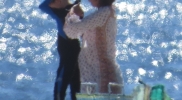
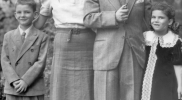
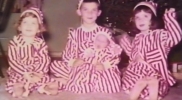




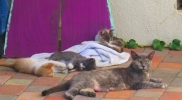
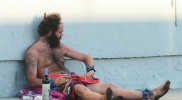
![[000015] [000015]](https://beforetheblog.com/wp-content/gallery/kids/thumbs/thumbs_000015.jpg)
